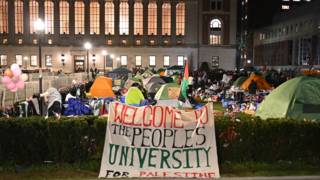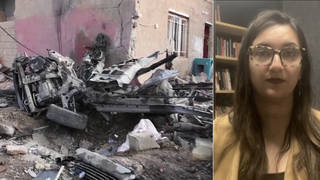
Related
Topics
Violent attacks continue across Iraq just days before the scheduled Jan. 30 elections. We go to Baghdad to speak with independent journalist Dahr Jamail who says, “Most Iraqis feels that this violence and chaos that has become the norm in Iraq will only continue to increase after the lections occur.” [includes rush transcript]
37 American soldiers were killed yesterday in the deadliest single day for US forces since the invasion of Iraq almost two years ago. A helicopter crash in western Iraq killed 30 marines and one Navy sailor. Officials in Washington said that bad weather was the most likely cause. Six US troops and at least 22 Iraqis were killed in separate incidents. The losses bring the total number of US soldiers killed in Iraq to over 1,400. As many as 100,000 Iraqis have been killed since the invasion began.
The latest violence come just days before scheduled elections in Iraq. At a news conference in Washington, President Bush called on Iraqis to “defy terrorists” and vote in Sunday’s poll even as violent attacks continued across the country.
- Dahr Jamail, an independent journalist currently based in Baghdad. He is one of the only independent, unembedded journalists in Iraq right now. He publishes his reports at DahrJamilIraq.com.
Transcript
AMY GOODMAN: Just before the program we spoke with independent journalist Dahr Jamail in Baghdad. This is his report.
DAHR JAMAIL: The election situation in Iraq is continuing to be one simply of chaos, frustration and extreme violence as it approaches. Now, apparently, with so many of the Iraqis I’m speaking with, there is great concern of divide. While on one hand all of the politicians are speaking of, yes, we are being divided more between Sunni, Shia, Kurdish, and so many of the religious leaders, as well, and there are some sectarian differences between Shia and Sunni arising; at the same time, so many Iraqis I speak with, in fact the vast majority, are saying, no, this is not the case, we have never had conflict between Shia and Sunni. So they are very determined not to have this divide occur from the elections. In fact, so many people, I’ll ask them, “Are you Shia or Sunni?” And they will just answer, “I’m Iraqi, what difference does it make?” But, nevertheless, it is a situation of great chaos in this lead-up to the elections.
Iraq has been under martial law since November 8, since the beginning of the siege of Fallujah. Those curfew hours are now being extended, as well. Baghdad Airport is closed for the 29th and 30th, possibly longer. The national borders are closed for the three days around the election, as are the satellite and cellular phone services. Civilian traffic will be very, very limited. And what the reaction this is causing on the ground essentially is, Iraqis — it is as if people are preparing for a war here. Shops are selling out of bread and food. There’s the ongoing gasoline crisis. So many families are even leaving Baghdad. In fact, there are long lines of tires stacked up at many of the check points around the capital city as people are taking their families and going to stay with relatives or friends in other small communities or villages or towns outside of Baghdad, and there even have been reports of essentially yet another refugee situation, except rather than Fallujah refugees this time, we have election refugees.
Another thing causing this is that as the polling stations are being barricaded off in order to try to protect them from attacks. Literally so many roads in Baghdad are literally shut down, at least 90, at last count. This is growing every single day, and people living near these polling stations, so many of them are schools, in fact. These people are very afraid because they are saying things like, “I have to leave now. I don’t want my home to get mortared, or I don’t want to be nearby when a giant suicide [inaudible] bomb strikes this polling station.” So, people are very frustrated with this. Many of these people are unable to get their cars out of their house because their streets are now blocked. So, it is very, very frustrating for Iraqis, a very dark climate of fear and anxiety, while at the same time many people do hope that somehow through these elections there will be some more stability and security, but most feel that the elections are not going to provide this. Most feel that this violence and chaos that has become the norm in occupied Iraq will only continue to increase after the elections occur.
AMY GOODMAN: Independent journalist Dahr Jamail, speaking to us from Baghdad.











Media Options